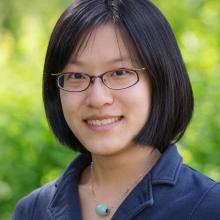Yaxi Hu
Doctoral student Yaxi Hu, under the supervision of professor Xiaonan, used a laser-equipped spectrometer and statistical analysis to determine with 99 per cent accuracy whether ground beef samples included other animal parts. Together with a team of other food science students, she was able to say with 80 per cent accuracy which animal parts were used, and in what concentration. This new method can accomplish all of this in less than five minutes, which makes it a potentially transformative food inspection tool for government and industry.
Why did you decide to pursue a graduate degree?
There are so many things to learn and I also want to be more competitive in the job market.
Why did you decide to study at UBC?
UBC has the supervisor that I want to study with.
What was the best surprise about UBC or life in Vancouver?
You can find all kinds of authentic Asian foods.
What aspect of your graduate program do you enjoy the most or are looking forward to with the greatest curiosity?
Food science students are not chefs but we still work with and think about food for our studies.
What aspects of your life or career before now have best prepared you for your UBC graduate program?
I had more than a dozen of lab courses during my undergraduate studies before I came to UBC, which equipped me with sufficient lab skills.
What do you like to do for fun or relaxation?
Trying those different restaurants with friends and learnng figure skating.
What advice do you have for new graduate students?
Appreciate the time you are in Vancouver, because it is not easy to find another place that offers a good university and good food in North America.
What was your Mitacs internship, and how did it contribute to your professional development?
I received the Mitacs Globalink Research Award and had the chance to study at Peking University in Beijing, China for 4 month from Dec 2015 to Apr 2016.
The research project I conducted at PKU was to use nuclear magnetic resonance spectroscopy to test Sudan I in paprika powder in a simpler and more time-efficient way compared to conventional methods. Sudan I is an industrial dye and banned to be used in food because it's a group III carcinogen. However, since it is cheap and has a bright red colour, Sudan I has been intentionally added into red/orange colour foods to enhance their apparent freshness.
Mitacs did a great job in supporting students to learn abroad and to create collaborations with researchers outside Canada. I had a great four-month experience learning in a different lab and seeing people working on different projects, which significantly broadened my horizon and changed my mindset to some extent. I would definitely recommend fellow students to participate in a Mitacs-funded internship if they want to get paid for learning and experiencing new things outside Canada.
Learn more about Yaxi's research
Food fraud is a severe global issue estimated to cost the global food industry $10-15 billion per year. While those committing food fraud set out to make economic profit, the practice can result in weakened consumer trust in government and food industries. More seriously, food fraud could pose health detriment to susceptive populations and the extraneous chemical added could be poisonous to humans. Serving as the last barrier to ensure food authenticity, reliable techniques to identify fraudulent foods are indispensable. Traditional techniques for food fraud detection are generally time consuming, complex, costly and/or require highly trained personnel, which are not ideal for the high-throughput screening required by inspection agencies and food industries. Therefore, the overall objective of my PhD thesis project is to establish innovative techniques for the analysis of food authenticity in a simple, rapid, accurate and/or cost-effective manner. I believe that the detection techniques being developed in my study will have a great potential to be adapted by inspection agencies, food industries and even consumers to better protect the authenticity and integrity of our food system.
